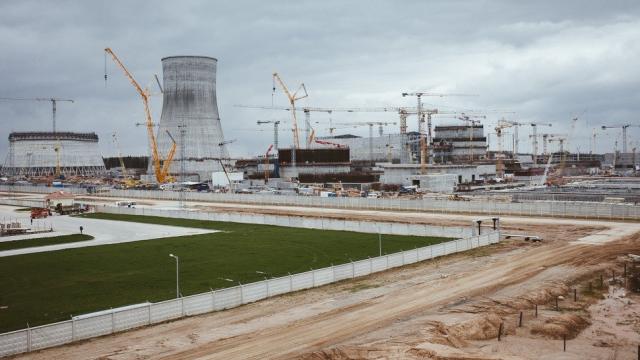In July, construction workers at the Astravets nuclear power plant in Belarus dropped a 300 tonne reactor shell. Weeks went by before the government admitted an “abnormal situation” had occurred, prompting international concerns about safety at the Russian-built facility — and the Belarusian government’s unwillingness to disclose information in a timely manner.
Image: DELFI
Mounting mishaps at the construction site are raising concerns over safety, particularly in the neighbouring country of Lithuania. Troublingly, government authorities in Belarus and those involved in the construction have been accused of withholding information, eliciting comparisons to Soviet-style secrecy during the Cold War.
Belarus, in an effort to free itself from Russia’s energy grip, is building a nuclear power plant in Astravets, a district located about 155km from the capital Minsk, and just 50km from Vilnius, the capital of Lithuania. Initial plans to build the plant were announced in the 1980s, but the Chernobyl disaster, which contaminated a quarter of Belarus, quickly put the kibosh on those plans. Now, some 30 years later, Belarus is going ahead with the nuclear plant. Things are not going well.
Last month, a member of the opposition United Civic Party claimed that a 300 tonne nuclear reactor shell had been dropped from a height of somewhere between two to four metres in preparation for installation. Two weeks went by before the Belarusian Energy Ministry confirmed that an “emergency situation” had happened. Work has now been suspended at the construction site.
The Russian state-owned company Rosatom — the project’s main contractor — denied that the reactor shell was damaged, saying installation should proceed as planned pending permission from authorities. Should any defects be found with the reactor vessel, Rosatom said it would replace the piece with a new one. A pair of Rosatom subsidiaries are now inspecting the shell.
And yes, a Russian company is building the plant, which seems odd given the geopolitical situation in Europe right now. Belarus, which imports about 90 per cent of its gas from Russia, is trying to free itself from its dominant neighbour. At the same time, Belarus is nervous about potential Russian incursions onto its territory. Nonetheless, Moscow is jointly financing the project, which is estimated to cost between $US5 billion to $US22 billion ($6.5 billion to 28.6 billion). Members of the Belarusian People’s Front have been protesting Russian involvement in the construction of the plant, saying the contract should have gone to a country other than Russia.
Back in April, a structural frame of the nuclear service building collapsed after workers, who were pressured to meet a deadline, poured too much concrete into the frame. As with the recent incident, Belarusian officials failed to divulge details.
The president of Belarus, Alexander Lukashenko, was suspiciously quiet after both accidents, drawing ire from domestic critics and the Lithuanian government. After downplaying the recent incident, a Lithuanian minister dismissed the “childish” explanations about the accident. Lithuania is threatening to block the plant coming online should Belarus fail to meet international safety standards. In response, Lukashenko told Lithuania to stop complaining and start helping his country run the plant. Meanwhile, the European Commission is looking into Lithuania’s complaints.
These incidents aside, experts are also worrying that the Belarusian government hasn’t performed the proper environmental-impact assessments for the facility. Once the plant goes into operation (sometime around November 2018) it will draw water for its cooling reactors from a river that also supplies drinking water in Lithuania. Again, this doesn’t seem very safe.
